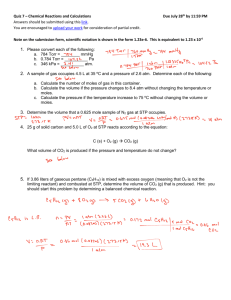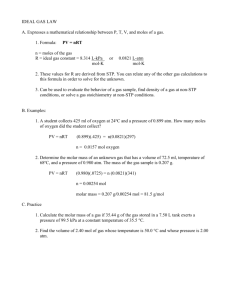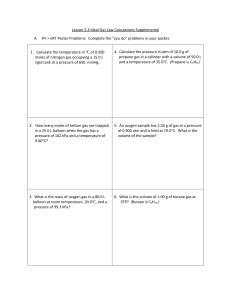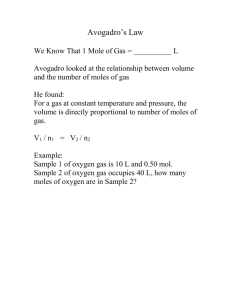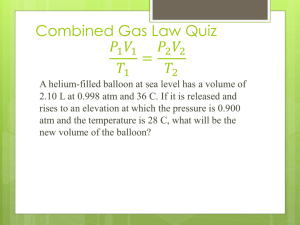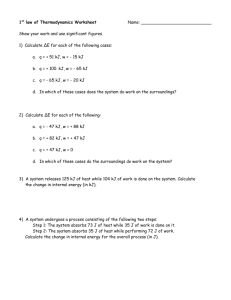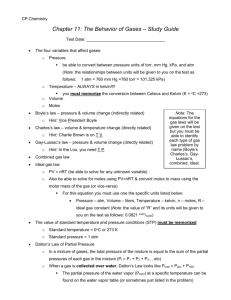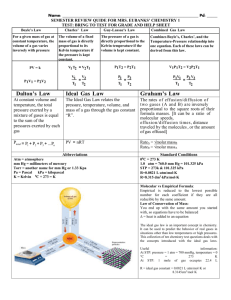Chemistry 114 First Hour Exam Name:____________ Please show all work for partial credit
advertisement
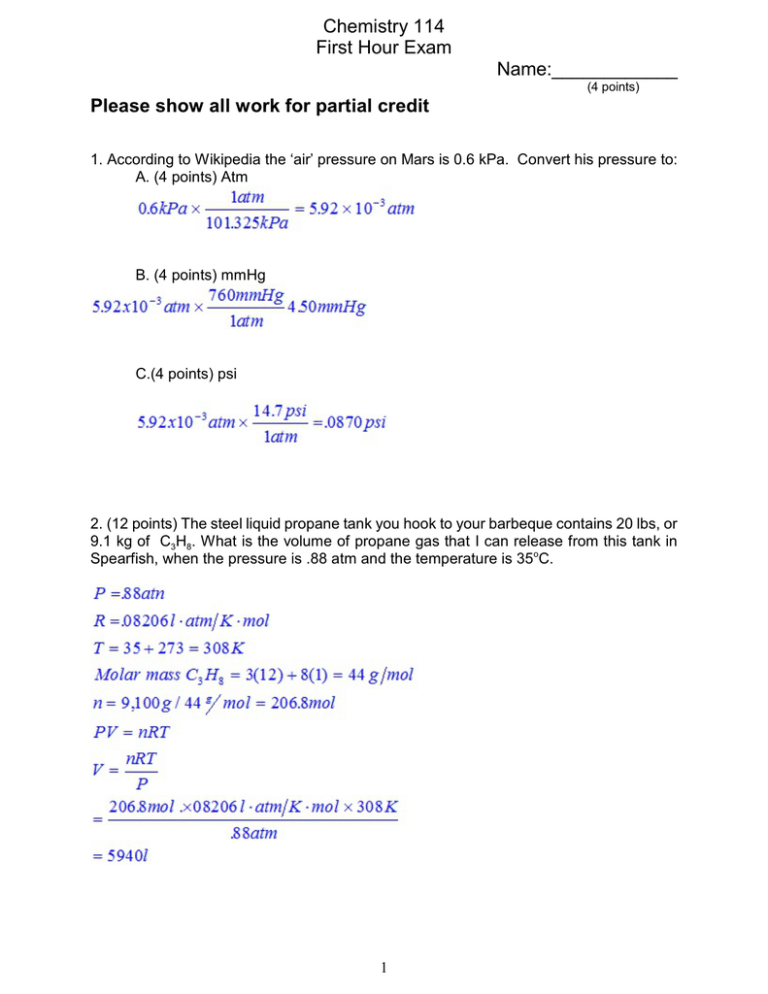
Chemistry 114 First Hour Exam Name:____________ (4 points) Please show all work for partial credit 1. According to Wikipedia the ‘air’ pressure on Mars is 0.6 kPa. Convert his pressure to: A. (4 points) Atm B. (4 points) mmHg C.(4 points) psi 2. (12 points) The steel liquid propane tank you hook to your barbeque contains 20 lbs, or 9.1 kg of C3H8. What is the volume of propane gas that I can release from this tank in Spearfish, when the pressure is .88 atm and the temperature is 35oC. 1 3.In the following 4 situations, give me the equation you would use to solve the problem, but DO NOT SOLVE! (Hint: the answer is NOT PV=nRT) A. (3 points) The initial pressure is 5 atm and the volume is 6 liters, what is the final volume if the pressure is changed to 7 atm? Variables: P&V Constants:n,R,T P1V1=nRT=P2V2 B. (3 points) The initial pressure is 500 psi when the temperature is 300K, what is the final pressure when the temperature changed to 500K? Variables:P&T PV=nRT; P1/T1=nR/V=P2/T2 Constants: n,R,V C. (3 points) If you have .5 moles of a gas at 50 kPa pressure, what is the new pressure if you add .2 more moles of gas? Variables: n & P PV=nRT P1/n1=RT/V=P2/n2 Constants: T,V,R D. (3 points) If you have 15 moles of a gas at 500 torr and 500K , what is the new pressure if you remove 5 moles of gas and increase the temperature to 700K? Variables: n,P,&T Constants: R,V PV=nRT P1/n1T1=R/V=P2/n2T2 4. (12 points) What is the density of Br2 gas at STP? Quick and Dirty: At STP (1 atm & 273K) 1 mole of gas occupies 22.42 liters 1 mole of Br2 gas has a mass of 79.9g x 2 = 159.8g Density = 159.8g/22.42l = 7.13 g/l Long way: P/RT ×molar mass = density Density = 1atm/(.08206l@atm/K@mol × 273K) ×159.8g = 7.13g/mol 2 5. Define the following terms (2 points each) Heat of formation - Energy gained or lost when a compound in its standard state if forms from its elements in their standard state. Molar Bond energy - The energy required to break 1 mole of a given type of chemical bond. Hess’s Law - If you add two or more chemical reactions together to create a new overall chemical reaction, you can find the ÄH of that new, overall reaction by adding the ÄH’s of the individual reactions together. Heat Capacity - The amount of heat required to raise the temperature of an object 1 C (or 1K). o Specific Heat Capacity - The amount of heat required to raise the temperature of one gram of material by 1oC (or 1K). Bomb Calorimeter - A calorimeter that is made of steel so its volume does not change. It is used to measure the ÄU of a reaction, since heat measured at a constant volume equals ÄU. 6. If my math is right, a butane cigarette lights contains 4 g of butane which corresponds to about .001 moles. This should correspond to 22.4 mLs of gas at STP. A. (6 points) Calculate the work involved in expanding a gas from 0 to 22.4 mLs final volume. (At STP) W= -PÄV = -1atm ×.0224L = -.0224l@atm -.0224 l@atm x 101.3J/l@atm = -2.27J B. (6 points) When burned, .001 moles of butane will release -2.87 kJ of heat energy. What is ÄU for the process of burning .001 moles of butane? ÄU=q+w = -2870 J + (-2.3J) = -2872J 3 7. (12 points) An earlier problem dealt with propane, C3H8. Use the following table of ÄHo f values to determine ÄHrxn for the reaction C3H8(g) + 5O2(g) 63CO2(g) + 4H2O(g) Substance ÄHof(kJ/mol) C3H8(g) -103.8 CO2(g) -393.5 H2O(l) -285.8 H2O(g) -241.8 ÄHrxn =3npÄHfp - 3nrÄHfr Note: O2 is en elemental form, so ÄHfo is zero and I do not have it in the table. =[3(-393.5) + 4(-241.8)]-[1(-103.8) + 5(0)] = -1180.5 - 967.2 + 103.8 = -2043.9 kJ 8. (12 points) I am going to drop a 500 gram block of aluminum that is at 99oC into 500 mLs of water that is at 1oC. Assuming adiabatic conditions, what is the final temperature of the system? (The specific heat capacity of aluminum is .83 J/mol@K, the specific heat capacity of water is 4.184 J/mol@K, and the density of water is 1g/mL) Adiabatic means ÄH=0 so 0 = Heat lost when aluminum cools + Heat gained as water warms 0 = S.H.C.al ×mass Al ×ÄTAl + S.H.C.H2O ×mass H2O ×ÄTH2O 0= [0.83 ×500×(TF-99)] + [4.184×500×(TF - 1)] -[0.83 ×500×(TF-99)] = [4.184×500×(TF - 1)] -0.83 ×500×(TF-99) = 4.184×500×(TF - 1) -415 (TF-99) = 2092 (TF - 1) -415 TF + 41085 = 2092TF - 2092 41085+ 2092 = 2092TF + 415TF 43177 = 2507TF TF = 431775/2507 = 17.2oC 4
